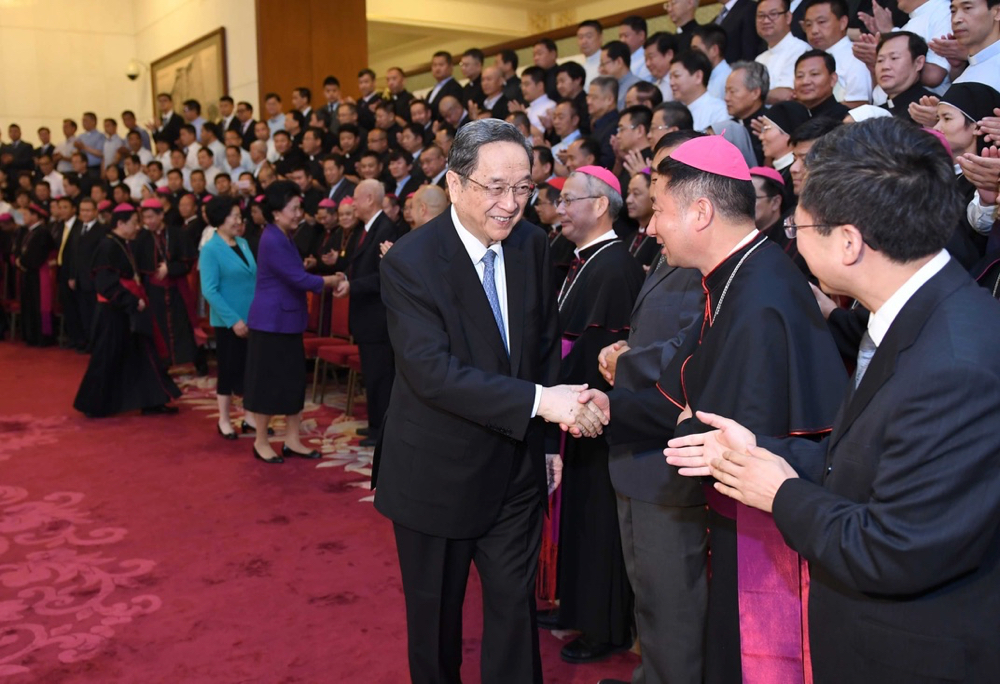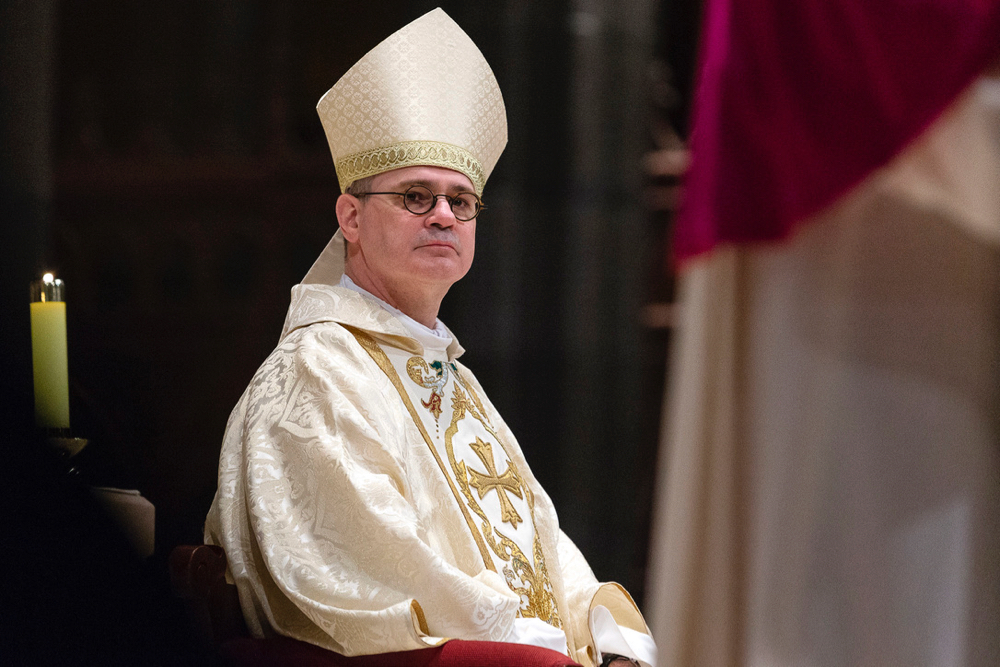Under previous pontificates bishops coming to Rome for meetings with Vatican officials could expect to be briefed about the work going on at head office and, if they had fallen out of line, should expect a stern telling off.
This is changing with Pope Francis. According to the Archbishop of Melbourne, Peter Comensoli, who was in Rome for the Australian Bishops’ “Ad Limina” gathering this week, the Roman Curia is listening to rather than lecturing the bishops toiling in the trenches.
“There’s none of this ‘we’re the schoolmaster, and you are the pupil’, all that seems to have gone,” the energetic 55-year-old archbishop told me when we sat down for an interview in between his hectic schedule of meetings in the Vatican.
Every five years bishops from a particular region are required to undertake an “ad limina apostolorum” visit as a group to the “tombs of the apostles”, where they meet the pope, report on the state of their dioceses and meet leaders of Vatican dicasteries. The last Australian bishops’ ad limina was eight years ago, with the delay caused by a backlog caused by the growth in the church and number of bishops worldwide.
“I was here at the last ad limina, back in 2011, and all the meetings with the dicasteries on those occasions were mainly a presentation of the dicastery, of what they were doing. That’s turned around completely. So far, it's ‘what do you want to share with us?’ ‘how can we help’?”
His remarks echo those of the Archbishop of Liverpool, Malcolm McMahon who also detected a different approach under the Francis curia during his visit last September, and an end to some of the “tension” that existed before between Rome and the English bishops.
This shift, Archbishop Comensoli explains, is evidence that reform of mentality is taking root in the Roman Curia, which Pope Francis sees as just as significant as re-organising structures. A new constitution for the Roman Curia, “Praedicate Evangelium”, (“Proclaim the Gospel”), which could come this September, is going to emphasise the importance of the Curia serving the local churches.
Listening is vital in the context of Australia, given how much has changed in the eight years since the bishops' last Rome pilgrimage. This period has seen devastating findings from public inquiries into clerical sexual abuse followed by the conviction and sentencing of Cardinal George Pell for sex offences.
Understandably, the Australian bishops’ morale was low when they arrived in the Eternal City this week, but Archbishop Comensoli that they were encouraged by their two-and-half hour meeting with Francis, leaving it feeling “uplifted” and buoyed up.
It was an example of putting listening into practice while underscoring the communion and collegiality that exists between the Church of Rome which “presides in charity” over the other churches.
Unlike in the past, when Francis meets bishops, he does not deliver a pre-prepared speech, or meet each one individually but opens up a group discussion.
“This was no formalised, ‘courtly’ action of any sort,” the archbishop said of the encounter while stressing he wouldn’t divulge specific details of what was said. “It was: welcome brothers. I am here as your brother, and let us converse together.”
The discussion was “shepherd to shepherd”, and allowed bishops to “speak very freely” about the Australian church.
“We had a long conversation around the indigenous in Australia, we touched on matters of formation, seminarians, and ongoing care of the clergy, being present to our people, and many, many more things,” he said.
“I found this wasn’t an opportunity to be critical or to say ‘this is not good, or why are you doing that?’ and it was, as a result, a deep dive into all sorts of significant areas for the life of the church in Australia, and the life of the Church more generally.”
Francis, the archbishop explained, listened “intently” and responded “directly” and “without any notes.” He added: “There’s no paper anywhere he didn’t know what we were going to ask. We didn’t know what we were going to ask or talk about.”
The desire by Rome to understand the local is mirrored in Archbishop Comensoli’s vision for the church in Melbourne, the most populous archdiocese in Australia with 210 parishes, 330 schools and where more than 1 million Catholics make up almost 30 per cent of the population.
He says it’s time to stop thinking about “a big Church” and look at bringing about “a renaissance of the life of local communities”.
In the background, however, is the Cardinal Pell case, and the appeal court is considering whether to uphold or quash his December 2018 conviction.
Archbishop Comensoli worked closely with the cardinal and former Archbishop of Melbourne: in 2011 Comensoli was named an auxiliary bishop in the Archdiocese of Sydney during Pell's tenure in Sydney and was the administrator of the archdiocese when the cardinal left to work on reforming the Vatican finances in Rome.
The sentencing of Cardinal Pell, he said, was a “blow that was very, very heavy for us. It was like – we were going here, and then it just dropped.”
Is it time, I ask, for a “post-Pell” church in Australia?
“No, it’s not a post-anyone’s Church,” he replies. “It is a wounded church, it is a hurting, struggling and at times confused Church. Connected to all this is where faith is in Australian society. It’s not post-anyone I don’t think because that conceptualises the church, that turns it into an abstract.”
The Church, the archbishop says, is “where the reality is”, and stresses people are “hurting, they are angry, they are very deeply disheartened and confused about what’s happening”.
He added: “It’s not just the abuse, it’s more about the not acting, or [not taking] the appropriate action. Yes, the abuse is appalling, and criminal, and terrible. You can’t say just how bad it is – diabolical. But the covering up, or the inaction, or the lack of listening, and believing victims for the care of them going forward, all that’s more the issue.”
At a personal level, the archbishop says: “I am at the foot of the cross,” and he is seeking inspiration from Mary and the apostle John, who sat at the foot of the cross. “How do we stay there with Jesus?”
He goes on: “The foot of the cross is where a family is, where home is. The Pope said something like this to us: Mary and John formed a home. Jesus formed a home, a family, on the cross.”
This theology means, a humbler, more credible Church, closely linked to local communities rather than super-structures.
“People still believe in Jesus Christ, so how do we build local neighbourhoods and communities of grace, such that God’s people, clergy and religious that come together in ways that are life-giving, for families, reaching out to the poor, our young people?” he says.
The time has come, he stresses, to move “away from the big structural and institutional, and big Catholic image of the Church to ask: where is the Gospel alive and being leavened, where is the leavening of God’s people?”
“Where does your average person engage with their faith, meet Jesus, and meet fellow believers, and build up their discipleship? That’s all at a local level,” he stressed.
Archbishop Comensoli set out this vision in a speech, the “Patrick Oration”, on St Patrick’s Day this year while last year told The Tablet about the importance of seeing the Church as the “people of God.”
Looking to the future, the Church in Australia holding a Plenary Council to renew its mission, a process that has seen 222,000 people take part in a consultation process ahead of a general assembly in October 2020. A plenary council, first mooted over a decade ago for Australia, can make significant pastoral - although non-doctrinal - decisions for a local church. Ultimately the final decisions will be made by the bishops and need to be ratified by Rome.
The archbishop said the process is not a “synod,” but a “synodal” process adding: “It’s a process of decision making, and decision taking.” While in Rome he said the bishops were offered encouragement and guidance from the Pope about “what’s involved in synodality” and the need for “prudential cautiousness”. The plenary council appears to echo what the Pope has repeatedly called for: a church that addresses the future collectively, in a bottom-up approach, where priests and people “walk together”.



 Loading ...
Loading ...